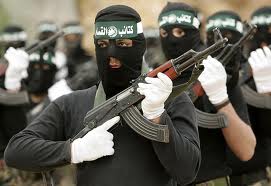We must drop the assumption that there is no way to vanquish Hamas. Terrorists have been defeated before.
By Andrew Roberts|November 28, 2012 7:00 AM
In a military operation that lasted just eight days, the Israeli Army killed Hamas’ military chief Ahmed Jabari; air strikes destroyed large numbers of Iranian-made rockets and missiles, many in underground sites; and the Iron Dome missile defense system brought down no fewer than 421 rockets launched from Gaza, an 84 percent success rate. What ought to happen next is that the makers of Iron Dome—a consortium led by Israel’s Rafael Advanced Weapons Systems Ltd.—should be awarded the Nobel Peace Prize. Israel should take the fight into the Hezbollah-controlled areas of Lebanon where a further 60,000 Iranian-made rockets and missiles are being hidden. And, above all, the civilized world should celebrate Israel’s victory, even if temporary, over this fascist organization.
Yet instead of calling for the ultimate downfall of Hamas—in the way that senior U.S. military figures speak of al-Qaida—we are gripped by an entirely unwarranted sense of defeatism over the terrorist group. Despite the fact that Israel won this latest battle, our commentariat seems to have embraced the assumption that there is simply no way to prevail politically or militarily over Hamas; they express no confidence in an eventual Israeli victory over Hamas’ foul and naked terrorism.
“Hamas and other militant groups will build better rockets,” whined Peter Beinart on The Daily Beast, “able to kill more Jews.” Yes, of course. But Israel will be simultaneously be able to build better Iron Domes, able to knock more rockets out of the sky. In the eternal battle between medieval hatred and Enlightenment technological know-how, the latter has always managed to contain the former.
“Does anyone actually believe that Israel would be able to fully neutralize the Hamas/Islamic Jihad threat?” blogged Jeffrey Goldberg. “Now is the time to try to Egypt card.” But assuming that President Morsi, late of the Muslim Brotherhood, is some sort of Israeli trump card is absurd. And the deployment of five batteries of Iron Dome actually does mean that much of the threat—indeed 84 percent of it—is being neutralized.
Meanwhile J Street put out a press release on Nov. 12 stating: “We are watching with grave concern the stepped-up rocket attacks from Gaza on southern Israel over the weekend, and we call upon the Palestinian factions responsible to cease fire immediately.” How about that for utterly pathetic? How likely was it that the Hamas leadership was going to suspend their attacks because they were being “called upon” to do so by a lobbying outfit based in Washington, D.C.?
So, on the one hand you have those who argue that yes, Israel was justified in carrying out Operation Pillar of Defense, but as a best-case scenario it merely bides time. Hamas will rearm, soon there will be another round, and the Jewish state will not be able to deal the group a fatal blow. On the other, you have those that are already preparing their Goldstone Report Part II about how Israel is committing war crimes, arguing that Hamas, though not blameless, is a legitimately elected government that Israel must come to terms with. Both of these perspectives come together to demand that Israel negotiate with Hamas—never mind the fact that Hamas is constitutionally committed to the destruction of Israel.
The fact that this, with rare exception, represents the entire spectrum of public debate about a savage terrorist organization shows terrible moral collapse. The West has defeated worse fascist entities than Hamas in the past and ought to be able to again in our own times. Even the Tamils are quiescent today, defeated by decades of relentless pressure brought against them by the forces of civilization, constitutionalism, law and order. Thousands died, just as they have in the Israeli-Palestinian struggle, but eventually the will of the terrorists was broken, and today Sri Lanka is rebuilding itself in peace.
The IRA similarly put up a 30-year long struggle against the democratic legitimacy of the British government, during a period in which every election returned a clear majority of members of parliament committed to keeping Northern Ireland as part of the United Kingdom. The IRA were brought to the table after it finally dawned on the republican communities of Ulster that the will of the British would not be broken, however many bombs went off. Even terrorist organizations with deep links in their communities can be defeated when it finally becomes clear to those communities that they are holding back an honorable, decent, and workable settlement. Especially when there is absolutely no hope of victory.
What cannot be allowed to continue is this defeatist assumption that vicious terrorism needs to be bought off, that there is no way militarily and politically to defeat our enemies, and that in even attempting to do so we are committing crimes as bad as they. The ghastly doctrine of moral equivalence that lurks in those assumptions is far more dangerous than any missile that Hamas can fire at Tel Aviv, or bus-bomb it can let off.
Reprinted from Tablet Magazine.
Andrew Roberts is a historian. His latest book is The Storm of War: A New History of the Second World War.



















